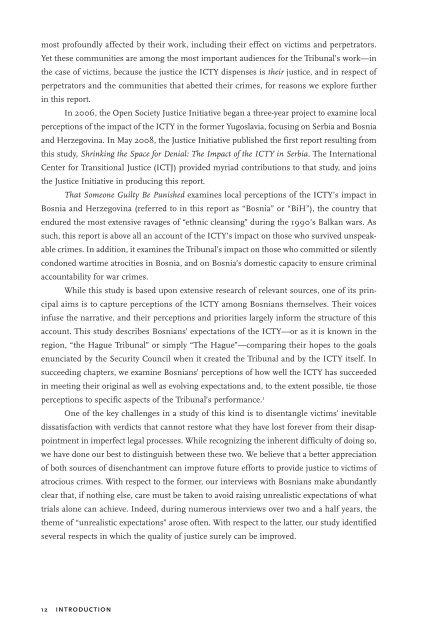That Someone Guilty Be Punished - Open Society Foundations
That Someone Guilty Be Punished - Open Society Foundations
That Someone Guilty Be Punished - Open Society Foundations
Create successful ePaper yourself
Turn your PDF publications into a flip-book with our unique Google optimized e-Paper software.
most profoundly affected by their work, including their effect on victims and perpetrators.<br />
Yet these communities are among the most important audiences for the Tribunal’s work—in<br />
the case of victims, because the justice the ICTY dispenses is their justice, and in respect of<br />
perpetrators and the communities that abetted their crimes, for reasons we explore further<br />
in this report.<br />
In 2006, the <strong>Open</strong> <strong>Society</strong> Justice Initiative began a three-year project to examine local<br />
perceptions of the impact of the ICTY in the former Yugoslavia, focusing on Serbia and Bosnia<br />
and Herzegovina. In May 2008, the Justice Initiative published the first report resulting from<br />
this study, Shrinking the Space for Denial: The Impact of the ICTY in Serbia. The International<br />
Center for Transitional Justice (ICTJ) provided myriad contributions to that study, and joins<br />
the Justice Initiative in producing this report.<br />
<strong>That</strong> <strong>Someone</strong> <strong>Guilty</strong> <strong>Be</strong> <strong>Punished</strong> examines local perceptions of the ICTY’s impact in<br />
Bosnia and Herzegovina (referred to in this report as “Bosnia” or “BiH”), the country that<br />
endured the most extensive ravages of “ethnic cleansing” during the 1990’s Balkan wars. As<br />
such, this report is above all an account of the ICTY’s impact on those who survived unspeakable<br />
crimes. In addition, it examines the Tribunal’s impact on those who committed or silently<br />
condoned wartime atrocities in Bosnia, and on Bosnia’s domestic capacity to ensure criminal<br />
accountability for war crimes.<br />
While this study is based upon extensive research of relevant sources, one of its principal<br />
aims is to capture perceptions of the ICTY among Bosnians themselves. Their voices<br />
infuse the narrative, and their perceptions and priorities largely inform the structure of this<br />
account. This study describes Bosnians’ expectations of the ICTY—or as it is known in the<br />
region, “the Hague Tribunal” or simply “The Hague”—comparing their hopes to the goals<br />
enunciated by the Security Council when it created the Tribunal and by the ICTY itself. In<br />
succeeding chapters, we examine Bosnians’ perceptions of how well the ICTY has succeeded<br />
in meeting their original as well as evolving expectations and, to the extent possible, tie those<br />
perceptions to specific aspects of the Tribunal’s performance. 1<br />
One of the key challenges in a study of this kind is to disentangle victims’ inevitable<br />
dissatisfaction with verdicts that cannot restore what they have lost forever from their disappointment<br />
in imperfect legal processes. While recognizing the inherent difficulty of doing so,<br />
we have done our best to distinguish between these two. We believe that a better appreciation<br />
of both sources of disenchantment can improve future efforts to provide justice to victims of<br />
atrocious crimes. With respect to the former, our interviews with Bosnians make abundantly<br />
clear that, if nothing else, care must be taken to avoid raising unrealistic expectations of what<br />
trials alone can achieve. Indeed, during numerous interviews over two and a half years, the<br />
theme of “unrealistic expectations” arose often. With respect to the latter, our study identified<br />
several respects in which the quality of justice surely can be improved.<br />
12 INTRODUCTION

















